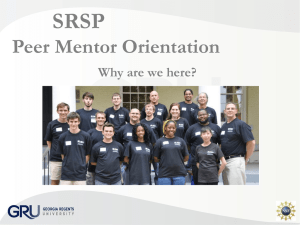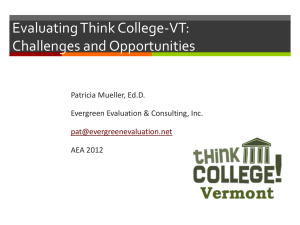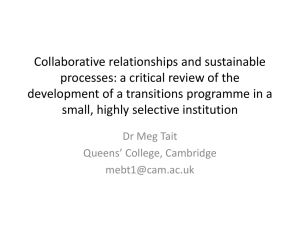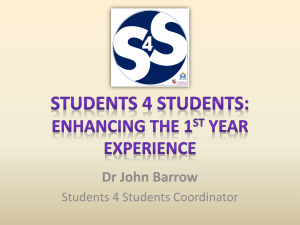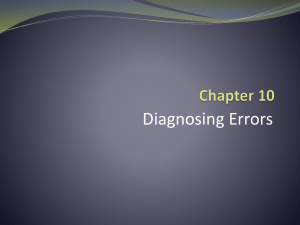Faculty Development Courses
advertisement
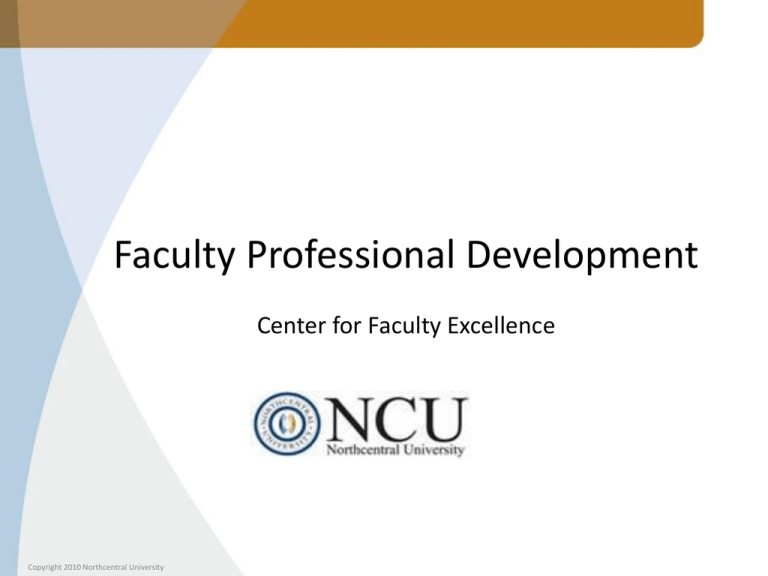
Faculty Professional Development Center for Faculty Excellence Copyright 2010 Northcentral University Faculty Development Courses • Northcentral University offers a wide variety of professional development courses for Faculty Mentors. Initially, new hires must take a training course. The training course is a prerequisite for all Faculty Mentors prior to the assignment of any Learners and is designed to provide new Faculty Mentors with an understanding of the policies and procedures that govern the University. • After completing this training course, a Faculty Mentor is required to complete one professional development course a year, unless an alternate activity is approved by the Provost. The following slides will describe the courses, and provides details concerning the opportunities that are available. Copyright 2010 Northcentral University Faculty Development Courses FMD Training course • All new Faculty will complete the FMD5000 FMD5000 – Distance Mentoring at NCU This course is designed to provide new NCU faculty with an understanding of the policies and procedures that govern the University. Faculty will develop the ability to navigate the NCU Mentor website, and will become familiar with its features. The course will also provide faculty with best practice guidelines to increase effective Faculty/student interactions. Copyright 2010 Northcentral University Faculty Development Courses Online Teaching Certificate An Online Teaching Certificate is obtained when an instructor successfully completes five FMD courses. Note: Training courses do not count towards your certificate. Once you have completed five FMD courses, please contact Mentor Services at cfe@ncu.edu to receive your certificate At the end of this PowerPoint presentation you will find Enrollment and General Information Copyright 2010 Northcentral University Faculty Development Courses COURSE LISTING • • • • • • • • • • FMD5011 – Online Learner/Online Mentor FMD5012 – Building an Online Learning Community FMD5013 – Critical Thinking and Writing FMD5016 – APA Style FMD5017 – Communication Tools FMD5018 – Authentic Learning Activities for the Online Course FMD5019 – Internet Search Skills FMD5022 – Tips and Tricks with Technology FMD5024 – Classroom Management FMD5114 – Library Research Copyright 2010 Northcentral University Faculty Development Courses FMD5011 – Online Learner / Online Mentor Course Description: This course explores the characteristics of the online Learner and strategies for teaching in the online environment. The course offers the distance Mentor an opportunity to develop online classroom management strategies. The emphasis of the course is on Mentor behaviors that constitute best practices in distance mentoring. Copyright 2010 Northcentral University Faculty Development Courses FMD5011 – Online Learner / Online Mentor Course Learning Outcomes: Upon completion of FMD5011 Mentors are able to: • • • • • • • • • • • Explore the implications of online learning Compare and contrast online learning vs. face-to-face learning Analyze personal technology skills Examine the most critical technology skills needed for online mentoring Evaluate the critical characteristics of an online learner Identify strategies of a successful online learner Assess potential learner needs in an online course Examine strategies for meeting the individual learning needs and learning styles of online learners Evaluate the critical characteristics of an online Mentor Assess personal skills in the role of an online Mentor Develop a personal improvement plan for an online Mentor. Continued on next slide… Copyright 2010 Northcentral University Faculty Development Courses FMD5011 – Online Learner / Online Mentor Course Concepts: Mentors will understand the major concepts of: • • • • • • • Copyright 2010 Northcentral University Online learning Online vs. Face-to-Face Learning Technology skills Online learner characteristics Meeting the needs of online learners Online Mentor characteristics Develop skills for online mentoring Faculty Development Courses FMD5012 – Building an Online Learning Community Course Description: Establishing community relieves Learners and Mentors from the sense of isolation sometimes experienced in online learning. This course explores ways to build a learning community through interaction. Copyright 2010 Northcentral University Faculty Development Courses FMD5012 – Building an Online Learning Community COURSE LEARNING OUTCOMES: Upon completion of FMD5012 Mentors will be able to: • Define an online learning community • Identify elements that foster the building of a learning community • Discuss the Mentor’s role in a course discussion forum • Assess the skills needed by a Mentor to communicate clearly through email • Evaluate effective management techniques for Mentors when responding to learners’ assignments • Recognize the need for additional Mentor action to assist Learners from diverse backgrounds or cultures • List ways to encourage interactivity and build a learning community. Continued on next slide… Copyright 2010 Northcentral University Faculty Development Courses FMD5012 – Building an Online Learning Community COURSE CONCEPTS: Mentors will understand the major concepts of: • • • • • • Copyright 2010 Northcentral University Learning communities Facilitation of course discussion forums Communication techniques Management techniques Recognition of diverse Learner needs Building interactivity Faculty Development Courses FMD5013 – Critical Thinking and Writing Course Description: Especially in the online environment, writing provides the main mode of communication. The critical thinking displayed in course writings becomes the basis for assessing Learner academic growth. This course explores the links between critical thinking and writing. In addition, the course discusses assessment and Mentor comments on Learner writing that provide a framework for improving writing scores and encouraging critical thinking. Copyright 2010 Northcentral University Faculty Development Courses FMD5013 – Critical Thinking and Writing COURSE LEARNING OUTCOMES: Upon completion of FMD5013 Mentors will be able to: • • • • • • • • • • • • • Explore the meaning of critical thinking on a personal level Analyze three stages of learning Evaluate the factors involved in critical thinking Examine the core critical thinking skills Assess personal disposition toward critical thinking and the impact on personal approaches to life Evaluate critical thinking beliefs of college faculty Identify and evaluate critical thinking skills found in selected Northcentral courses Evaluate four common types of responses to learner assignments and writing Analyze and evaluate sample responses to learner writing Assess the advantages of using Bloom’s taxonomy of critical thinking skills to evaluate learner work Identify and evaluate the use of Bloom’s critical thinking skills in selected Northcentral courses Analyze the benefits and limitations of learner feedback on Mentor effectiveness Identify strategies for improving the quality of feedback on learner assignments. Copyright 2010 Northcentral University Continued on next slide… Faculty Development Courses FMD5013 – Critical Thinking and Writing COURSE CONCEPTS: Mentors will understand the major concepts of: • Online learning Copyright 2010 Northcentral University Faculty Development Courses FMD5016 – APA Style Course Description: This course acts an introduction to APA formatting. Practice in a variety of citations, in-text citations, and formatting of written documents will sharpen the skills of those experienced in APA and provide necessary skills for those new to this style of formatting. The course will address some of the more commonly made mistakes in research papers by Learners and will provide ongoing updates with regard to new APA standards. (1 credit) Copyright 2010 Northcentral University Faculty Development Courses FMD5016 – APA Style COURSE LEARNING OUTCOMES: Upon completion of FMD5016 Mentors will be able to: • • • • Identify problem areas that Learners have with APA formatting Illustrate competency using APA formatting Demonstrate the ability to develop an APA reference list in the APA citation style Explain some of the common errors Learners make with APA formatting COURSE CONCEPTS: Mentors will understand the major concepts of: • • • • APA citation style APA grammatical style APA formatting – entire documents Northcentral Dissertation Handbook and its application using APA style Copyright 2010 Northcentral University Faculty Development Courses FMD5017 – Communication Tools Course Description: This course introduces education applications to communication tools. Blogs, wikis, RSS feeds, pod casting, chat, discussion, video clips, PowerPoint and interactive media will be explored. Copyright 2010 Northcentral University Faculty Development Courses FMD5017 – Communication Tools COURSE LEARNING OUTCOMES: Upon completion of FMD5017 Mentors will be able to: • • • • • • • • • • • • • Define the term blog Evaluate the use of blogs in the academic environment. Define the term wiki Analyze the potential of wikis in higher education Explain how an RSS feeder or aggregator works Subscribe to blogs through an RSS aggregator Explain and define the term pod casting Analyze the potential uses of MP3 players for learning Assess the features of PowerPoint that could be used in an interactive fashion Design an interactive PowerPoint presentation Evaluate the potential for and benefits of networking with other educators Outline a professional development plan to sustain lifelong learning in online mentoring Analyze the potential opportunities for the educational marketplace of the future. Continued on next slide… Copyright 2010 Northcentral University Faculty Development Courses FMD5017 – Communication Tools COURSE CONCEPTS: Mentors will understand the major concepts of: • • • • • • • • Copyright 2010 Northcentral University Blogs Wikis RSS feeders/Aggregators iPods and MP3 Players Pod casting Interactive PowerPoint Online networking Educational marketplace of the future Faculty Development Courses FMD5018 – Authentic Learning Activities for the Online Course Course Description: This course will focus on the variety of meaningful learning activities that can be created for online courses. Online course activities throughout any one single course, should be varied and should offer Learners meaningful, experiential learning opportunities. This course will examine how written activities, research activities, multimedia and web-based activities can be designed and integrated into an online course. Copyright 2010 Northcentral University Faculty Development Courses FMD5018 – Authentic Learning Activities for the Online Course COURSE LEARNING OUTCOMES: Upon completion of FMD5018 Mentors will be able to: • Examine the characteristics of authentic learning activities • Analyze the elements of problem-based learning, project-based learning, and case-based learning activities • Evaluate the aspects of writing assignments in an online course • Design a writing assignment appropriate for an online course • Propose alternative assignments to the traditional research report • Design an alternative research assignment • Investigate multimedia tools that have the potential of being integrated into a course assignment • Design a course assignment that utilizes a form of multimedia • Analyze the characteristics of web-based course activities • Design a web-based course assignment/activity for an online course • Examine the characteristics of spreadsheet and database applications • Design a course activity that utilizes a spreadsheet or Copyright 2010 Northcentral University Continued on next slide… Faculty Development Courses FMD5018 – Authentic Learning Activities for the Online Course COURSE CONCEPTS: Mentors will understand the major concepts of: • • • • • • • • • Copyright 2010 Northcentral University Authentic learning activities Problem-based learning Project-based learning Case-based learning Writing assignments Alternative to research reports Multimedia tools Web-based activities Spreadsheet & database applications Faculty Development Courses FMD5019 – Internet Search Skills Course Description: The topics covered in this course include how a search engine works, types of search engines, search strategies, using operators for effective searching, when not to use a search engine, search engine alternatives, search engines vs. directories, evaluating website content. Copyright 2010 Northcentral University Faculty Development Courses FMD5019 – Internet Search Skills COURSE LEARNING OUTCOMES: Upon completion of FMD5019 Mentors will be able to: • • • • • • • • • • • • • Understand how a search engine works Define the term search engine Evaluate the pros and cons of search engines Select the correct search engine for a query Define the term Metasearch engine Compare and contrast a Metasearch engine and a directory Define the term Invisible Web and use it effectively Identify specialty search engines Correctly utilize a graphical search engine Examine and evaluate effective search strategies Identify and utilize Boolean operators Examine alternatives for search engines Evaluate web site content Continued on next slide… Copyright 2010 Northcentral University Faculty Development Courses FMD5019 – Internet Search Skills COURSE CONCEPTS: Mentors will understand the major concepts of: • • • • • • • • • Search engines Metasearch engines Search directory Invisible web Specialty search engines Graphical search engines Search strategies Boolean operators Evaluate web site content Copyright 2010 Northcentral University Faculty Development Courses FMD5022 – Tips and Tricks with Technology Course Description: This course will focus on presenting skills that will aid the online instructor with the use of productivity tools in the Microsoft Office suite (Word, PowerPoint, Excel, Access, and Outlook). The course will present those features of software programs that are often under utilized or unknown. The goal of the course is to help participants make the most of using Office products effectively and efficiently. Copyright 2010 Northcentral University Faculty Development Courses FMD5022 – Tips and Tricks with Technology COURSE LEARNING OUTCOMES: Upon completion of FMD5022 Mentors will be able to: • Evaluate ways to manage digital files • Develop a system of efficiency with managing digital files • Understand the basics of Windows as an operating system • Examine tips for utilizing Microsoft Word • Analyze and develop ways to become more proficient in Microsoft Word • Examine tips for utilizing Microsoft Excel • Analyze and develop ways to become more proficient in Microsoft Excel • Examine tips for utilizing Microsoft Access • Analyze and develop ways to become more proficient in Microsoft Access • Compare and contrast the functions of a database and spreadsheet • Examine tips for utilizing Microsoft PowerPoint • Analyze and develop ways to become more proficient in Microsoft PowerPoint • Examine tips for utilizing Microsoft Outlook • Examine tips for utilizing the Internet • Analyze and develop ways to become more proficient in Microsoft Outlook Continued on next slide… Copyright 2010 Northcentral University Faculty Development Courses FMD5022 – Tips and Tricks with Technology COURSE CONCEPTS: Mentors will understand the major concepts of: • • • • • • • • • Managing Files Windows Windows Explorer Microsoft Word Microsoft Excel Microsoft Access Microsoft PowerPoint Microsoft Outlook The Internet Copyright 2010 Northcentral University Faculty Development Courses FMD5024 – Classroom Management Course Description: The topics covered in this course include plagiarism, meaningful feedback to learners, handling a difficult student, encouraging participation, strategies for student retention, overall classroom management and time saving tips. Copyright 2010 Northcentral University Faculty Development Courses FMD5024 – Classroom Management COURSE LEARNING OUTCOMES: Upon completion of FMD5024 Mentors will be able to: • • • • • • • • • • • • • • Define copyright and fair use. Examine issues regarding intellectual property. Identify procedures for protecting work and materials. Define plagiarism. Understand the reasons why learners may plagiarize. Describe ways to prevent plagiarism. Analyze the competencies for online instructors. Identify successful instructional strategies for online teaching Understand privacy issues and concerns in an online environment Suggest strategies for dealing with online student behavior Examine strategies to encourage student participation Discover ways to foster online discussions Recognize the needs of students in order to foster student retention Describe strategies for effective file management and Continued on next slide… Copyright 2010 Northcentral University Faculty Development Courses FMD5024 – Classroom Management COURSE CONCEPTS: Mentors will understand the major concepts of: • • • • • • • • • • Copyright and fair use Intellectual property Plagiarism Online Instructor competencies Strategies for successful online teaching Privacy issues Dealing with online student behavior Encouraging online student participation Fostering online discussions File management and record keeping Copyright 2010 Northcentral University Faculty Development Courses FMD5114 – Library Research Course Description: FMD 5114 is intended to encourage Mentors to enhance their courses with resources and services available in the Northcentral University Library. In addition, Mentors will gain a better understanding of library practices, such as information literacy, research terminology, and database use. Mentors play a role in the selection of resources the Library provides. As you become familiar with the Library, you can help us identify any gaps in the collection or request resources to be acquired for your courses. Copyright 2010 Northcentral University Faculty Development Courses FMD5114 – Library Research COURSE LEARNING OUTCOMES: Upon completion of FMD5114 Mentors will be able to: • Investigate the Library resources and services and assess how the Library can enhance Northcentral Courses • Compare and contrast websites to determine their reliability and applicability for Northcentral courses • Design assignments centering on research utilizing the Library Databases • Examine the Library Database tools used for research and determine how they could be included within the course syllabi • Evaluate Library resources and provide feedback for improved services offered to Mentors. Copyright 2010 Northcentral University Faculty Development Courses FMD5114 – Library Research COURSE CONCEPTS: Mentors will understand the major concepts of: • • • • • Northcentral Library Databases Library Guides The Research Process Website Evaluation Northcentral Library Services Copyright 2010 Northcentral University Faculty Development Courses ENROLLMENT AND GENERAL INFORMATION Certificates are available to any active Mentor in good standing with Northcentral University. To enroll in a FMD course please contact Lavinia Nowosielski at lnowosielski@ncu.edu , please indicate the course number and a date you would like to start the course, courses are scheduled for the 1st and 15th of each month. The Mentor may begin taking courses and must complete each course successfully within the allotted timeframe, before registering for the next course. The courses can be taken in any order and the Mentor may select any five courses. It is the responsibility of the Mentor to notify the Office of Mentor Services at cfe@ncu.edu, once you have successfully completed five courses. After verification of the completed courses, a certificate is issued Grading: “S” Satisfactory / “U” Unsatisfactory Copyright 2010 Northcentral University Faculty Development Courses Thank you for your continuing development, dedication, support, and contribution to Learner success. Mission, Vision and Values Northcentral University is committed to providing people throughout the world with quality educational opportunities by offering accredited graduate and undergraduate programs through a proven, fully online, distinctive faculty mentored approach to learning. With highly credentialed and passionate staff, utilizing progressive methodologies, Northcentral University prepares graduates to be distinguished contributors to societies around the globe. Values represent beliefs that the University holds in high regard and deems important in higher education. Northcentral University recognizes the keen interconnection of its organizational culture and the beliefs, values, and expectations that guide the behavior of the members of the institution. To achieve its Mission and Vision, Northcentral University affirms its values of Learner Focus, Integrity, Innovation, Respect for Others, Teamwork, Leadership, and Performance. Learner Focus Our Learners are our clients. We are deeply committed to meeting the needs of our Learners, and we constantly focus on putting people and their educational needs first in distance learning. Integrity We hold ourselves to the highest ethical standards in relationships with our constituencies. Innovation Innovation is the key to improving the quality of our educational programs and services. Respect We recognize that our people are the cornerstone of our success. We value our diversity of thought and action as a source of strength, and we are committed to treat people with respect and dignity. Teamwork We know that to have a successful university a community of Learners, Faculty Mentors, and staff must work together, frequently transcending organizational and geographical boundaries. Leadership We believe that leaders exhibit standards for others to follow. Leaders achieve difficult goals, envision new and innovative educational delivery systems, and challenge outdated concepts of learning. Performance We strive for continuous improvement in our performance. We define and measure outcomes and take corrective action to ensure that our passion for excellence is never compromised. Copyright 2010 Northcentral University Faculty Development Courses . Thank you for participating in our Faculty Development Training Please direct any questions to cfe@ncu.edu Copyright 2010 Northcentral University
